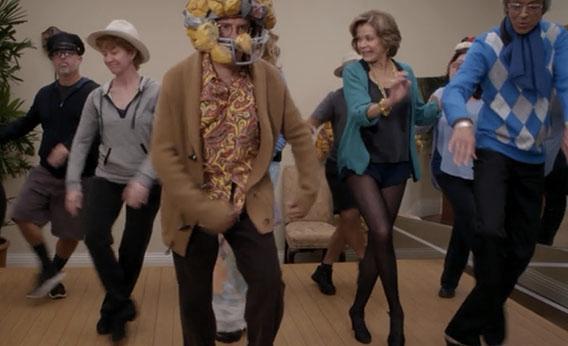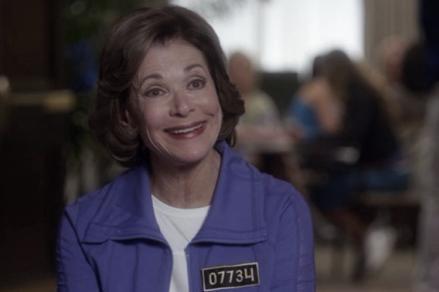In Slate’s Arrested Development TV Club, two fans will IM about each episode of Season 4 once they finish watching it. Today, culture critic June Thomas and Vault editor Rebecca Onion recap Episode 10, “Queen B.”
June Thomas: Rebecca, I’m glad I get to discuss this episode with a real-life academic, because I think I’m going to need some fancy French theories to sort out my response to some aspects of “Queen B.” On one hand, I was deliriously happy to spend time with Lucille. Her scenes with Buster were the cattiest thing since Bette Davis squared off with Joan Crawford in What Ever Happened to Baby Jane?—and then the courtroom confrontation with Lucille 2 was even B-word-ier. I loved seeing Tommy Tune, and Jessica Walter’s amazing gams, but the stuff around the Chinese gang in Lucille’s country-club prison made me uncomfortable.
Rebecca Onion: Ha! I will try to oblige. I, too, was so comfortable and happy in Gangie’s company. Her scenes with Tobias—which, if I’m not mistaken, were pretty rare in previous seasons—were delightful and unexpected. Jessica Walter and David Cross both have such perfect timing and amazing faces, I could watch them interact all day. I definitely agree with you about the Chinese gang—the “loophole” bit in particular made me squirm. Lucille’s relationship with nonwhite people has always been a discomfiting manifestation of her total self-centeredness—just ask Lupe the housekeeper—so I wonder whether the Chinese gang was supposed to be just another Lucille moment. But I wasn’t entirely convinced that we were supposed to be laughing at Lucille and not at the mahjong ladies.
Thomas: That’s it exactly. There’s always been a comedic fearlessness to Arrested Development—they play lots of touchy subjects for laughs, real third-rail topics like registered sex offenders—and the Bluths have definitely been racist before. But in the past it made sense: The Bluths are a bunch of entitled, selfish people, and their appalling attitudes to people not like them have always been believable. But this time we’re not only seeing the Jade Dragon Triad gang from Lucille’s point of view. But I guess it’s also liberating—on Arrested Development, deluded douchiness isn’t just for rich white folks.
While “roophore” was painful, it was at least a callback to Lucille smoke-torturing Buster. And the China Garden/Olive Garden thing (“I got Olive Garden to offer unlimited bread”) was mildly amusing. But even apart from the stereotypes, the dig at the Real Housewives franchise was a limp noodle.
Onion: It was definitely no sharpened ramen shiv. I felt sort of the same way about To Entrap a Local Predator in Episode 5—although I’m now on record as having laughed at it, that was because it involved Tobias, not because it was a clever send-up. That kind of satire feels over to me almost as soon as it happens. The jokes I love AD for are the absurdist ones, like the fact that Lucille’s trial took place in a seafood restaurant, and she had to wait in the walk-in fridge for her verdict. It feels like those will wear better than the fake TV shows.
Thomas: Or perhaps those TV show jokes need a little more distance—or a little more subtlety. I smiled every time I saw Bernie Kopell, Dr. Bricker from The Love Boat, taking a spoonful of chowder while he served as the judge in Lucille’s trial.
Onion: The failed Jade Dragon Triad bit aside, how did you feel about the Lucille episode in general? She’s always been such an entertaining garnish to the ensemble, does it work for her to carry a whole episode? Did you feel sympathy for her? Do you think the show really wanted us to feel for her—because her family failed to show up at her trial or to visit her in prison—or was that attempt to humanize the “villain” more ironic than sincere?
Thomas: I loved the episode overall. Jessica Walter has more range than all the other amazing comic actors in the AD cast. She is usually as dry as those martinis Buster lined up for her, and she’s fabulous in that register, but at the end of the episode, when she benefited from Tobias’ accidental counseling, I was convinced that Lucille was experiencing a genuine breakthrough. On the other hand, I’m fond of Jeffrey Tambor, but when George Sr. cried earlier in this episode, I didn’t buy it emotionally—not for a second. What about you?
Rebecca: It’s interesting to think of Lucille’s standalone episode in comparison with the George Sr. ones we’ve had so far. Like a child who demands her parents always remain the same, I’ve been really resistant to George Sr.’s emotional transformation in this season (whether the changes were caused by stress, a wish accidentally made while a child was blowing out a birthday candle, or the maca-inspired vision of a fake shaman). George Sr.’s wily, selfish, resourceful ways were one of the two constants of the series (with Michael’s good-guy likability being the other). Season 4 takes both the strong patriarch and the long-suffering son away from us! Though I understand that those characters need to “grow” sometime, it does feel a bit false, like something being done just for the sake of doing. Like, This is the season where everything changes—you’ll take this crying Tambor, and you’ll like it. But Lucille’s emotional breakthrough at the end of the episode doesn’t feel like a false transformation—I don’t know if it’s because of Jessica Walter’s chops, or because it makes sense for her character to say, “Enough already.” I don’t think I’ll actually get an answer to this question, given the season’s narrative structure, but I really do wonder what a transformed Lucille would do with her freedom.

Courtesy of Netflix
Thomas: Do you think we’re supposed to think that Lucille killed Lucille 2? I was frustrated and disappointed by the open-endedness of the series, and in particular by the mystery of what happened to Lucille Austero on the stair car. I think our tolerance of a “cliffhanger” in what is in all likelihood a series finale is allowing the Arrested Development creative team to get away with narrative murder.
Onion: I wonder about that. There are so many other little mysteries in the rest of the Season 4 episodes that are eventually solved that the slate is set for fans to rewind and rewatch over and over, trying to find the clues we missed. It seems like it’d be really mean for them to weave an unsolvable mystery in with all those solvable ones. Would a possible movie pick up that thread? (I haven’t read anything much about plans for the movie.) Could it be an open door through which they’re hoping to walk in the future?
Thomas: I assumed that the unsolved mystery was a setup for the movie Mitch Hurwitz has always said he wanted to make, but personally—and I should say that I speak as a casual AD viewer rather than a superfan—my Arrested Development cravings are more than sated by these 15 episodes. After watching Season 4, I feel about the show like a kid feels about chocolate two days after Halloween: I don’t know that I ever want to eat another bite-size Twix bar.
Onion: Ha! I would have said I was a superfan, and yesterday I did spend too much time going down the rabbit hole of the AD wiki looking up clips of old jokes that got called back in the new episodes. On the other hand, after watching all of this season in a row, the jaunty theme song doesn’t cue salivation the way it once did. I feel a little like a drained and sopping-wet CEO emerging from George Sr.’s sweat lodge. Which is to say, wrung out and tired. And in desperate need of some $10,000 lemonade.
—
